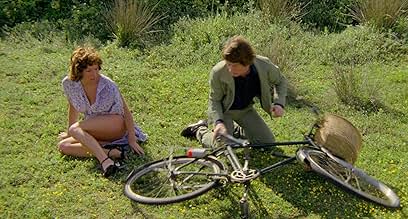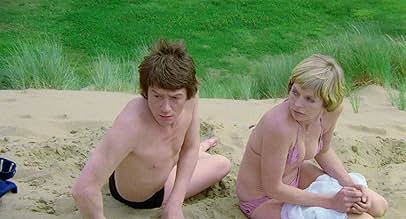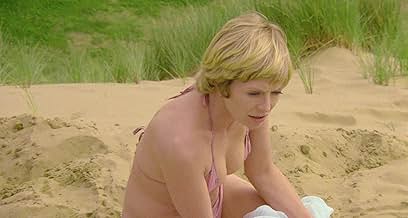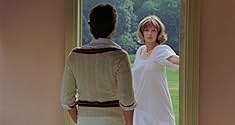IMDb RATING
6.5/10
5.8K
YOUR RATING
A traveller by the name of Crossley forces himself upon a musician and his wife in a lonely part of Devon, and uses the aboriginal magic he has learned to displace his host.A traveller by the name of Crossley forces himself upon a musician and his wife in a lonely part of Devon, and uses the aboriginal magic he has learned to displace his host.A traveller by the name of Crossley forces himself upon a musician and his wife in a lonely part of Devon, and uses the aboriginal magic he has learned to displace his host.
- Director
- Writers
- Stars
- Awards
- 1 win & 1 nomination total
Graham Kingsley Brown
- Village Churchgoer
- (uncredited)
Joanna Szczerbic
- Cricket Umpire
- (uncredited)
- Director
- Writers
- All cast & crew
- Production, box office & more at IMDbPro
Featured reviews
I don't recall now how I'd heard of this movie, but having heard of it, I was motivated enough to get a copy from the Amazon UK site (region-free players are a must; region encoding should be abolished!).
From the very start of the movie, it's clear it will be unusual. First we see a woman drive up to a building. She is ushered into a room where there are three dead men, apparently naked, laid out under white sheets on what seem to be dining tables. She stops at the third one. Then, we see an black, likely aboriginal, man wandering in a desert or among sand dunes, and he approaches with a sharp bone. Then a man (Tim Curry) arrives at an asylum, where he is assigned the job of score-keeping for a game of cricket the patients and staff are about to begin. The other scorekeeper, one of the patients, starts to tell him a story....
That's a lot of jumping around just to start the film! There are layers in the film, due to the storytelling, and not everything is chronological, and perhaps not everything is even true.
The story involves the man telling the story (Alan Bates) and one of the men playing cricket (John Hurt). John Hurt's character plays organ at a church, when he gets there on time, anyway, and at home records a variety of sounds, amplifying them in such a way they sound unusual. He meets Alan Bates, a strange man who had learned some aboriginal magic when he lived in Australia, and Bates manages to enter Hurt's home and life.
The story structure and the involvement of an asylum called to mind The Cabinet of Dr. Caligari for me, and now seeing the comments of others, I see I'm not alone. One other movie that came to mind while watching The Shout was Picnic at Hanging Rock (1975) because of the Australian weirdness and artiness in both films.
I can't claim to understand everything in the film. For example, at one point a character wakes up and he's temporarily confused about his identity and profession, a problem that reoccurs at least once thereafter. Additionally, there's some digging in the sand for rocks which seem related to people somehow. In spite of this, or perhaps because of this to a degree (I like some mystery sometimes), I enjoyed the movie, and I'm glad I bought it.
From the very start of the movie, it's clear it will be unusual. First we see a woman drive up to a building. She is ushered into a room where there are three dead men, apparently naked, laid out under white sheets on what seem to be dining tables. She stops at the third one. Then, we see an black, likely aboriginal, man wandering in a desert or among sand dunes, and he approaches with a sharp bone. Then a man (Tim Curry) arrives at an asylum, where he is assigned the job of score-keeping for a game of cricket the patients and staff are about to begin. The other scorekeeper, one of the patients, starts to tell him a story....
That's a lot of jumping around just to start the film! There are layers in the film, due to the storytelling, and not everything is chronological, and perhaps not everything is even true.
The story involves the man telling the story (Alan Bates) and one of the men playing cricket (John Hurt). John Hurt's character plays organ at a church, when he gets there on time, anyway, and at home records a variety of sounds, amplifying them in such a way they sound unusual. He meets Alan Bates, a strange man who had learned some aboriginal magic when he lived in Australia, and Bates manages to enter Hurt's home and life.
The story structure and the involvement of an asylum called to mind The Cabinet of Dr. Caligari for me, and now seeing the comments of others, I see I'm not alone. One other movie that came to mind while watching The Shout was Picnic at Hanging Rock (1975) because of the Australian weirdness and artiness in both films.
I can't claim to understand everything in the film. For example, at one point a character wakes up and he's temporarily confused about his identity and profession, a problem that reoccurs at least once thereafter. Additionally, there's some digging in the sand for rocks which seem related to people somehow. In spite of this, or perhaps because of this to a degree (I like some mystery sometimes), I enjoyed the movie, and I'm glad I bought it.
Anthony and his wife Rachel (John Hurt and Susannah York) invite a bizarre drifter named Charles (Alan Bates) into their home for lunch. Charles claims to have spent the last 18 months in the Australian outback. He also says that he's acquired the ability to kill by merely shouting.
Anthony doubts the story, so, Charles takes him out and proves it to him. Unfortunately for Rachel, Charles has even more wickedness up his sleeve.
THE SHOUT is a magnificently odd little film about magic, madness, and death. It's told via flashback in a mental institution.
Highly recommended for fans of the dark and different... Be sure to watch for Tim Curry!
Anthony doubts the story, so, Charles takes him out and proves it to him. Unfortunately for Rachel, Charles has even more wickedness up his sleeve.
THE SHOUT is a magnificently odd little film about magic, madness, and death. It's told via flashback in a mental institution.
Highly recommended for fans of the dark and different... Be sure to watch for Tim Curry!
I saw this film for the first time when I was just 17 years old and it made an impression which has lasted another 25 yrs. I just cant forget it. To this day, I cannot think of another film which captures so much about the isolation of English civility from the raw power of tribal beliefs, and to bring them together in the gentility and peace of a rural Devon setting.. even the "Wicker Man" fails to gain such potency as it is set in what is from the beginning contrived to be island cultures.. remote from civil society, whereas "The Shout" is both in your face, while (as a 1970's film) hauntingly suggestive of unspoken fears and longings. As such it speaks of the era within which it was made, a time of fragile contentment and almost subversive experimentation with.. other ways of viewing the world. Bates and York's performances are also totally believable which contrasted with the other-worldly nature of the setting and story make it compelling viewing. As another review stated.. I believe this to be a thoroughly underrated film, while for me at least definitely.. a classic.
Previous commentators have remarked upon the similarity of the framing story of this film (that reunites the author and star of 'I Claudius') to 'The Cabinet of Dr. Caligari'; but no one yet seems to have noticed the resemblance to Pasolini's 'Teorema', in which Terence Stamp rocks the boat of a bourgeois household with a similar mystical droit du seigneur to that exercised by Alan Bates over a youthful John Hurt's luscious wife Susannah York (who at one point has a remarkably feral nude scene on all fours), despite his unkempt appearance and army greatcoat that recall Davies from 'The Caretaker' more than Bates' earlier saturnine romantic leads.
Most reviewers seem also to be taking this tall tale of bucolic rumpy pumpy with more of a straight face than it's actual makers may have been. But it clearly needs to be seen (and listened to) more than once.
Most reviewers seem also to be taking this tall tale of bucolic rumpy pumpy with more of a straight face than it's actual makers may have been. But it clearly needs to be seen (and listened to) more than once.
'The Shout' is one of the most underrated thrillers of the 70s, and should be spoken of in the same breath as the much more celebrated 'Don't Look Now' and 'The Wicker Man'. All three put complex and original adult approaches to the supernatural thriller genre. Alan Bates ('Whistle Down The Wind') really shines in this movie as the mysterious and charismatic stranger cum shaman Crossley, who turns a comfortably bohemian middle class marriage upside down. The couple are played by John Hurt ('The Elephant Man') and Susannah York ('Superman'), and they are both first rate, as is Tim Curry ('Rocky Horror') in a smaller but important supporting role. But as good as they all are this is Bates' movie all the way in an unforgettable performance. A haunting, dreamlike puzzle of a movie that improves with multiple viewings. Highly recommended!
Did you know
- TriviaThis movie was notable for its time, for its use of an electronic and avant-garde music score, which, when heard in theaters in Dolby Stereo, was aurally separating and distorting. Reportedly, forty different music tracks were used for the sound.
- Quotes
Charles Crossley: Get out of here Anthony, or I'll shout your bloody ears off.
- ConnectionsFeatured in The Guard (2011)
- How long is The Shout?Powered by Alexa
Details
- Release date
- Country of origin
- Language
- Also known as
- El grito
- Filming locations
- Devon, England, UK(photographed entirely on location in North Devon, England)
- Production companies
- See more company credits at IMDbPro
Box office
- Budget
- £5,000,000 (estimated)
Contribute to this page
Suggest an edit or add missing content

































